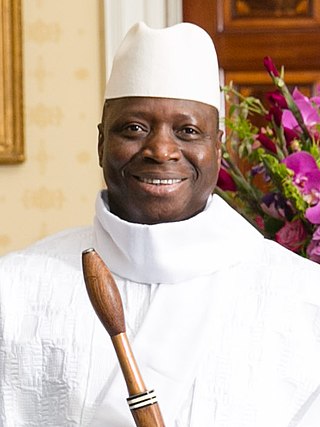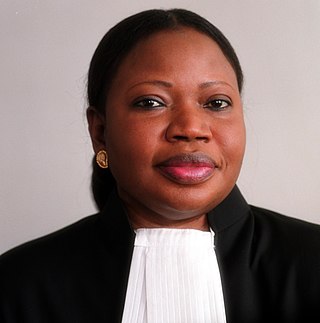Related Research Articles

The Gambia, officially the Republic of The Gambia, and sometimes shortened to just Gambia, is a country in West Africa. It is the smallest country within mainland Africa and is surrounded by Senegal, except for its western coast on the Atlantic Ocean. The Gambia is situated on both sides of the lower reaches of the Gambia River, the nation's namesake, which flows through the centre of The Gambia and empties into the Atlantic Ocean, and elucidates the long shape of the country. It has an area of 11,300 square kilometres (4,400 sq mi) with a population of 1,857,181 as of the April 2013 census. Banjul is the Gambian capital and the country's largest metropolitan area, while the largest cities are Serekunda and Brikama.

The first written records of the region come from French traders (barbers) in the 9th and 10th centuries. In medieval times, the region was dominated by the Trans-Saharan trade and was ruled by the Mali Empire. In the 16th century, the region came to be ruled by the Songhai Empire. The first Europeans to visit the Gambia River were the Portuguese in the 15th century, in 1447, who attempted to settle on the river banks, but no settlement of significant size was established. Descendants of the Portuguese settlers remained until the 18th century. In the late 16th century, English merchants attempted to begin a trade with the Gambia, reporting that it was "a river of secret trade and riches concealed by the Portuguese."

"For The Gambia Our Homeland" is the national anthem of the Gambia. It is based on the music of a traditional Mandinka song, to which original Mandinka lyrics were written by Jali Nyama Suso. An English arrangement and translation were made by husband and wife Jeremy and Virginia Howe and adopted as the national anthem in 1965.

Yahya Abdul-Aziz Jemus Junkung Jammeh is a Gambian politician and former military officer, who served as President of the Gambia from 1996 to 2017, as well as Chairman of the Armed Forces Provisional Ruling Council from 1994 to 1996.
Kukoi Samba Sanyang was a Gambian politician and leader of the unsuccessful 1981 coup d'état against the government of Dawda Jawara.

Islam is the major religion in the Gambia, representing 96% of the 2 million population, with the first Muslim communities in the country arriving in 11th century. Islam has therefore had an influence on the Gambia throughout history, and continues to impact its culture, society and politics. The majority of The Gambia's Muslims are Sunni belonging to the Maliki school of jurisprudence, influenced with Sufism. There is a smaller Shiite community, largely stemming form Lebanese and Arab migration. The Ahmadiyya movement is also present. Other religious societies exist in the country, including Catholics, Protestants, Hindus and Traditional African religions.

Gambia is a Muslim majority country, with Muslims constituting 96.4% of the population, some 3.5% are Christian, and 0.1% practice other religions.
The Gambian hip hop scene is a relatively new scene in African hip hop which developed in the mid-1990s and was heavily influenced by American hip hop and Senegalese hip hop. Gambian hip-hop has been heavily influenced by international music scene including worldbeat, Senegalese wolof music, and American hip hop, as well as traditional Gambian mbalax and n'daga music. Dominican merengue and Jamaican reggae, ragga, and dancehall have also influenced the development of Gambian hip-hop.

Fatou Bom Bensouda is a Gambian lawyer and former Prosecutor of the International Criminal Court (ICC), who has served as the Gambian High Commissioner to the United Kingdom since 3 August 2022.

Alieu Ebrima Cham Joof commonly known as Cham Joof or Alhaji Cham Joof, was a Gambian historian, politician, author, trade unionist, broadcaster, radio programme director, scout master, Pan-Africanist, lecturer, columnist, activist and an African nationalist who advocated for the Gambia's independence during the colonial era.

Joof or Diouf is a surname that is typically Serer. This surname is also spelt Juuf or Juf.

A constitutional crisis occurred in Gambia following presidential elections in December 2016, in which challenger Adama Barrow achieved an upset victory over longtime incumbent Yahya Jammeh. It eventually concluded after a military intervention by the Economic Community of West African States (ECOWAS) led to Jammeh’s departure from the country.

The Attorney General of the Gambia is a cabinet-level position in the Gambia responsible for providing legal advice to the Gambian government and appearing on its behalf in the courts of the land. In recent years, the post has been held in conjunction with that of Minister of Justice, who is the head of the Ministry of Justice and responsible for legal affairs. The current Attorney General is Dawda A. Jallow.
Marie Saine-Firdaus is a Gambian lawyer and politician.
Raymond Claudius Sock is a Gambian judge who currently serves as a Justice of the Supreme Court of the Gambia. He had previously served as a Justice from 2012 to 2015, when he was dismissed by President Yahya Jammeh.
The Solicitor General of the Gambia is a senior government lawyer in the Gambia who serves as the second most senior official in the Ministry of Justice after the Attorney General/Minister of Justice. The incumbent Solicitor General is Cherno Marenah.

The Minister of Justice in the Gambia is the cabinet member who heads the Ministry of Justice. All Ministers of Justice concurrently serve as Attorney General.
Muhammed Arif is a Pakistani judge who served as a served as Justice at the Supreme Court of Pakistan from 1998 to 2002. Within this period, he was Chief Justice of Gambia from 2001 to 2003.
Emmanuel Akomaye Agim is a Nigerian judge who was chief justice of Gambia from 2009 to 2013 former chief justice of Swaziland. former justice at the Nigerian Courts of Appeal. and currently a Justice of the Supreme Court of Nigeria.
Gambian literature consists of the oral and written literary tradition of the people of the Gambia. Oral literature, including the traditional griots and various forms of ritual poetry, has historically been the predominant type of cultural transmission in line with the wider Senegambia. An English-language, written Gambian literature has emerged since the 1960s, spearheaded by Lenrie Peters.
References
- ↑ Jammeh, Ousman A. S. (2011). The Constitutional Law of the Gambia: 1965 - 2010. AuthorHouse. ISBN 9781467007405.
- ↑ Jallow, Hassan B. (2012-10-19). Journey for Justice. AuthorHouse. ISBN 9781477223468.